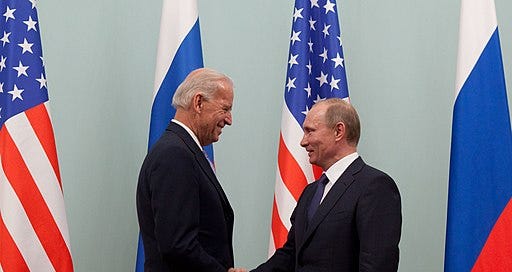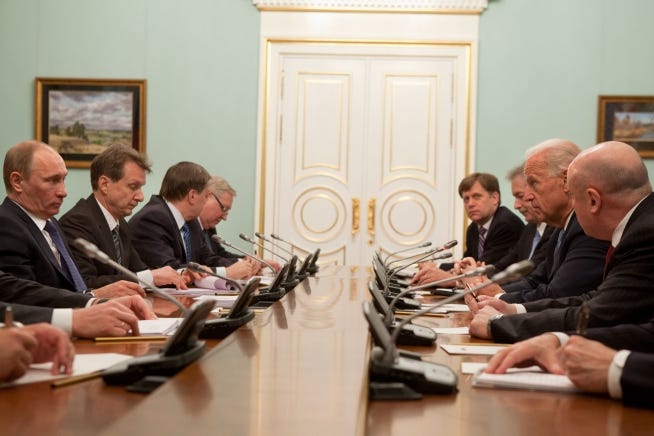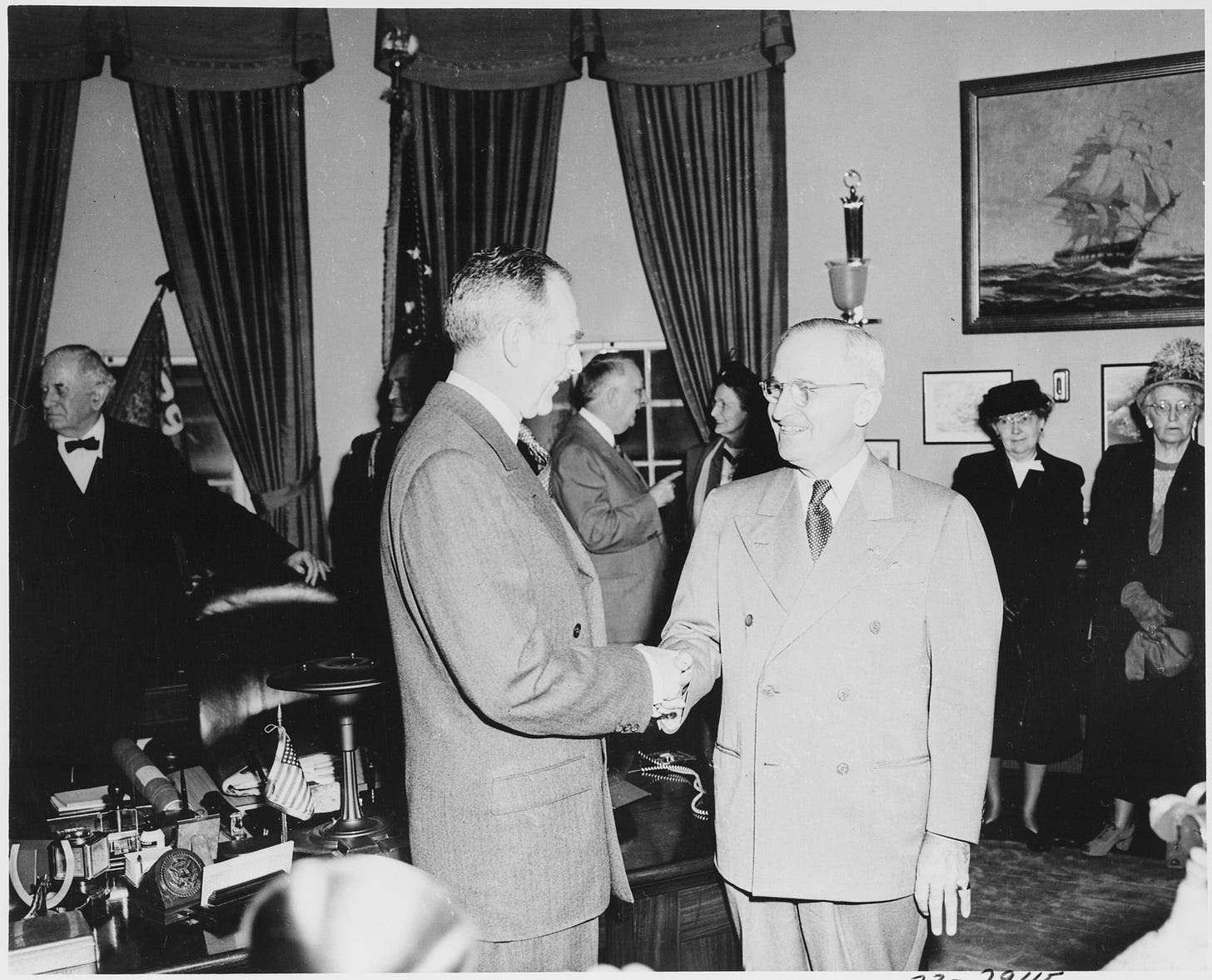NOVEMBER 23—Although we are still roughly two months away from the inauguration of the 46th president of the United States, it is possible to paint an informed though necessarily incomplete picture of what the future might hold for U.S.–Russia relations once Joe Biden assumes office.
It is likely to be a very mixed bag.
Recall that Donald Trump spent the whole of his term fending off charges of being “soft” (or worse) on Russia. Yet, despite the risible, indeed, contemptible hysteria that has emanated 24/7/365 from MSNBC and CNN for the past four years, Trump actually pursued a harder line against Russia than did his predecessor. But this simple fact was lost—intentionally obscured, indeed—by the madness of the #Resistance, whose paranoia and delusion gripped the American political-media class, particularly as it concerned Russia.
The last time we saw anything remotely comparable was during the 1950s, when President Eisenhower was accused by the John Birch Society of being “a dedicated, conscious agent of the Communist conspiracy.”
The key difference between Trump and Biden with regard to Russia policy is that, come January 20th, Biden will have a free hand to pursue a more constructive relationship should he choose to so; after all, the restraints that were placed on Trump will not be applied to Biden.
“Should he choose to do so”: This is our key phrase.
There are plenty of reasons to doubt Biden will do the right thing. First, there is his history of undiplomatic interactions with the current Russian president, Vladimir Putin. It is possible that bad blood remains as a residue of Russiagate and Washington’s clashing interests over NATO, Ukraine, Libya, Syria, Iran, NordStream 2, and sanctions the Obama administration imposed in 2014, after Moscow reacted to the violent coup in Kiev. Yet few today will remember a trip Biden, then Obama’s vice-president, made to Moscow in February 2011, just as Putin (prime minister at the time) was likely in the process of deciding whether to return to the Kremlin as president the following year. In a forum at the U.S. ambassador’s residence in central Moscow, Biden went out of his way to express his view that Putin shouldn’t return to the presidency for a third term. It was on that same trip Biden claims to have told the Russian leader that he didn’t think Putin had “a soul.”
So much for diplomacy.
If, as the old adage suggests, personnel is policy, then there are plenty of reasons not to be optimistic that Biden will pursue a more rational, less confrontational Russia policy. As just suggested, the Biden transition team does not inspire overmuch confidence. It seems at least of one of the Valkyries responsible for the Libyan fiasco, Samantha Power, is currently briefing the president-elect on national security matters.
After weeks of rumors who might be asked to join a Biden cabinet, the names are now emerging. The Washington Post reported 10 days ago, that Hillary Clinton might be asked to become ambassador to the U.N. This now appears unlikely: As of last weekend Linda Thomas-Greenfield, a foreign service lifer, seems the front-runner. Clinton’s longtime foreign policy adviser, Jake Sullivan, was just handed the post of national security adviser. It was Sullivan who famously informed his then-boss, Secretary Clinton, that “AQ is on our side in Syria.”
That odious development, the tacit alliance between the U.S. and al-Qaeda, should have, but did not, dampen enthusiasm for regime change in Damascus. Biden’s nominee for secretary of state, Antony Blinken, likewise was a proponent for each of the Obama-era interventions and seems, if his comments to CBS in May are any indication, he would like another shot at fomenting regime change in Syria. Meantime, that longtime creature of the government-defense industry-think tank revolving door, Michelle Flournoy, is set to become the first female secretary of defense.
The lesson here is clear: If you have a long record of expressing fealty to the failed bipartisan foreign policy consensus of the last 30 years: You’re in. But if you have a record of questioning it: You’re out. What’s likely in store, safe to infer, is Obama redux, only worse.
Oddly, this has not met with the disapproval one might have expected from those who are said to be our leading progressive foreign policy thinkers. Matt Duss, the mysteriously well-regarded former Center for American Progress staffer-turned Sanders adviser, sent “love and strength” to his friend Blinken via Twitter on election night.
Yet there is one, and perhaps only one, bright spot: how Biden might manage arms control. Trump’s record is an abomination in this area: The INF and Open Skies treaties are both high-profile casualties of his administration’s careless disregard for American national security. Biden has a chance to fix this. And should he choose to do so, he has excellent people available to him: former Obama officials Alexandra Bell and Lynn Rusten, the Quincy Institute’s Joe Cirincione, and former State Department official Tom Countryman are but some of the names one hopes are on his shortlist to clean up the mess Trump left with essential help from Secretary of State Pompeo; Mark Esper, the just-fired defense secretary, John Bolton, once and briefly national security adviser, and his successor Robert O’Brien.
The reappointment of Obama’s energy secretary, Ernest Moniz, would be a farsighted and welcome appointment for advocates of a sane nuclear weapons and arms-control policy. Moniz, a trained nuclear physicist, has spent the last several years on as co-chair and CEO of the Nuclear Threat Initiative and was, by most accounts, the principle architect of the Iran nuclear agreement. Indeed, if Biden were smart, Dr. Moniz would be on his short list for State, Defense, and national security adviser.
A lost tradition.
Yet even if Biden makes a sincere attempt to “reset” the U.S.–Russian relationship, how likely is it he will succeed? On this point, I have little cause for optimism because the underlying cause of the dysfunction within the relationship will most assuredly not be addressed during the Biden presidency.
The fact remains that the Russian and American weltanschauungen are severely out of step. And the respective premises with which each nation approaches the world are utterly incompatible.
American foreign policy is based on the universalist assumption that it is the duty and providential right of the U.S. government to remake the world in its self-image. This is has been the running theme since the Wilson presidency a century ago: to make the world safe for liberal democracy. It is an inherently revolutionary worldview and, as we have seen over the past 30 years, its pursuit sows instability and chaos the world over. Such a policy would be anathema to our own Founders, yet, in an odd, somewhat ironic twist given the hysteria with regard to all-things-Russia these days, closely resembles the Trotskyite ethos of pursuing violent, never-ending revolution on behalf of one’s chosen ideology. The dominant ideologies of the American foreign policy establishment—neoconservatism and liberal intervention—are about as American as a matryoshka doll.
On the opposite side, we have Russia’s foreign policy as currently overseen by Vladimir Putin and his longtime foreign minister, Sergei Lavrov. For all the talk (and some of it for good reason) about the opaqueness of the Russian state, Lavrov and Putin have been relative models of transparency with regard to how they view the world. Search their respective public statements and it becomes remarkably clear that for them stability in their own neighborhood is their highest priority.
That goal is pursued through an old-fashioned (and many would claim, with some justification, inconsistent) respect for the sovereignty of nations, a concept dating to 1648 at Westphalia, which, three centuries later, served as the cornerstone of the postwar settlement as enshrined in the U.N. Founding Charter.
As I have noted elsewhere, the foreign policy Putin and Lavrov have pursued most resembles not that of the Soviets, as serial alarmists and opportunists like Anne Applebaum and Max Boot would have us believe, but that of Charles de Gaulle. With respect for sovereignty comes stability. And without stability, you’re nowhere.
There was once a generation of American elites that understood this. Franklin Roosevelt’s “good neighbor” policy emphasized it. To FDR, a good neighbor was one who “resolutely respects himself and, because he does so, respects the rights of others, the neighbor who respects his obligations and respects the sanctity of his agreements in and with a World of neighbors.” As Cordell Hull put it while serving as Roosevelt’s secretary of state: “No country has the right to intervene in the internal or external affairs of another.”
The architects of the U.N. Charter also knew this. And yet that vision, which respected pluralism abroad and rejected military interventions in the furtherance of a particular ideology, was cruelly hijacked after April 12,1945. From then on, Truman, his secretary of state, Dean Acheson, and the other founders of the Cold War national security state—James Forrestal, Paul Nitze, Frank Wisner, et al. and their sanguinary cheerleaders in the press (particularly the Alsop brothers, Joe and Stewart) set us on a path away from our best traditions, leaving us where we find ourselves today.
A return to our best traditions will lead us to a much better place with the Russians. The shame of it is, there seems little to no chance that will happen under a Biden administration. But it is well to recall that these traditions remain, long submerged but ever available to us should we choose to restore ourselves to them.








Jeffrey thanks for the note. I fear you are probably right! best, jc
Honestly I could care less if the US immolates itself with its demented military policies. What I don't want is for the rest of the World to be detroyed because of gross American hubris!